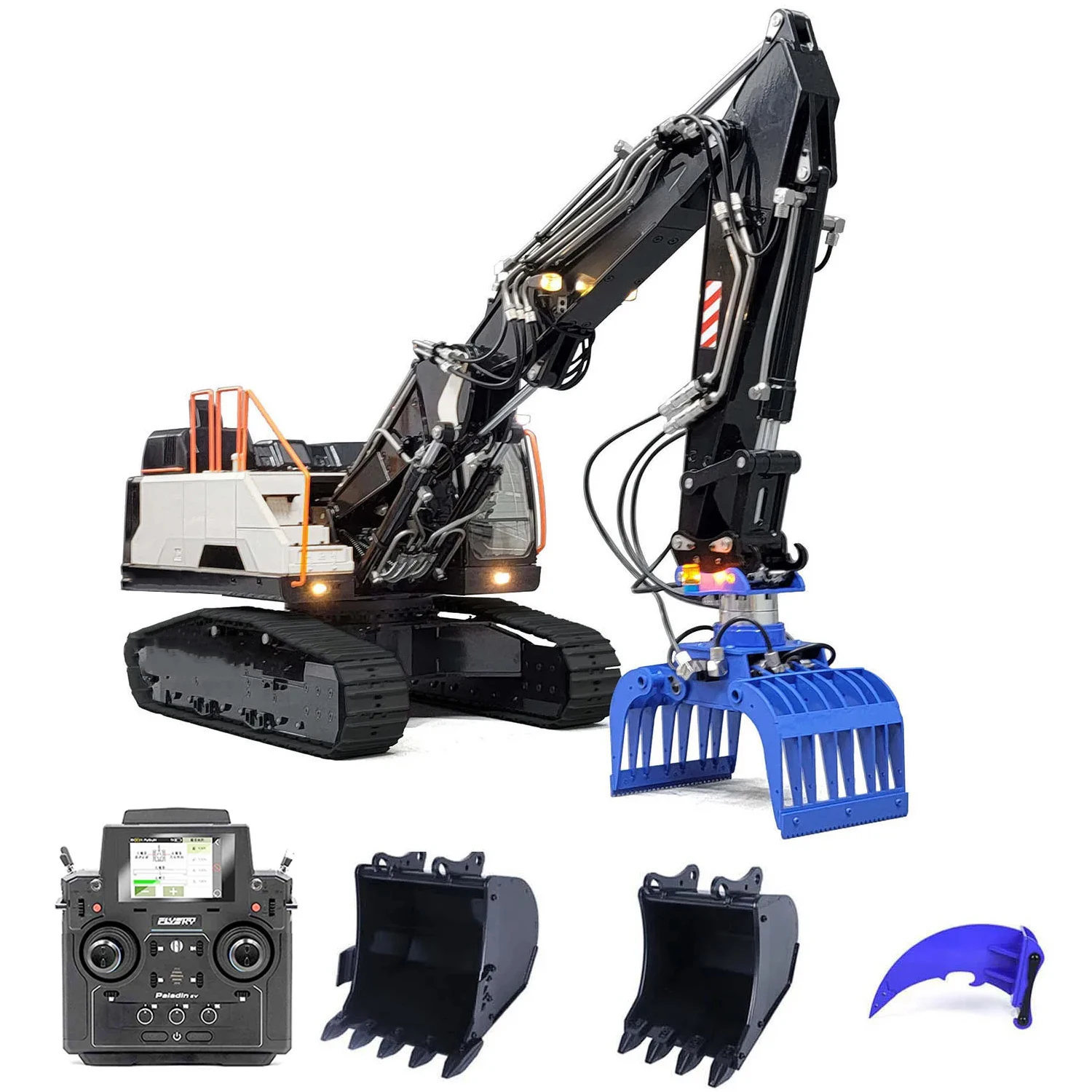What Makes the rc excavator Stand Out Among Other Construction Machines
Wiki Article
Understanding Just How Excavator Functions and Its Effect On Performance
Excavators play a crucial duty in building and mining operations, relying upon a complicated interplay of mechanical and hydraulic systems. Their capability to perform a variety of jobs rests on both their style and the technology incorporated within. Comprehending these parts can greatly influence functional performance and performance. As improvements proceed to reshape the industry, one should consider exactly how these adjustments will affect future methods and performance.The Fundamentals of Excavator Mechanics

The Duty of Hydraulic Systems in Excavators
At the heart of excavator operation lies the hydraulic system, which plays a pivotal function in powering the maker's motions and functions. This system makes use of pressurized hydraulic fluid to transfer energy, making it possible for various activities such as training, excavating, and moving. By harnessing the principles of hydraulics, excavators can perform tasks with exceptional accuracy and pressure, improving total operational efficiency.The hydraulic system contains key components, including shutoffs, cylinders, and pumps, which collaborate to manage the flow and direction of the fluid. When the operator involves the controls, the hydraulic fluid is routed to certain cylinders, converting the driver's commands into physical activity. This device enables receptive and smooth activities, which are vital in building and construction and excavation environments. double e volvo rc excavator. The effectiveness of the hydraulic system directly influences the productivity and convenience of the excavator, making it an essential aspect in modern-day excavation processesSecret Elements of an Excavator
Recognizing the crucial components of an excavator is necessary for grasping exactly how this powerful maker operates. An excavator contains numerous substantial aspects, consisting of the undercarriage, house, pail, boom, and arm. The undercarriage supplies security and flexibility, often including wheels or tracks to navigate various surfaces. Your home consists of the engine and hydraulic systems, allowing the operator to control motion and power the machine. The boom prolongs from the home, making it possible for upright reach, while the arm connects to the bucket, facilitating digging and training operations.Additionally, the cab houses the driver, furnished with controls for precise handling. Each of these elements plays an important duty in the excavator's overall capability, contributing to its effectiveness and effectiveness on building sites. Recognizing these components assists in maximizing and maintaining excavator performance, ensuring tasks are completed securely and properly.Accessory Convenience and Its Benefits
Attachment versatility is an important aspect of excavators, making it possible for operators to switch between different tools customized for specific tasks. This flexibility not only enhances job efficiency but likewise adds to cost-effectiveness by decreasing the requirement for numerous machines. Understanding the various sorts of attachments readily available can considerably affect the overall efficiency and performance of an excavator on task sites.Sorts of Accessories
While excavators are mainly acknowledged for their digging capabilities, their real versatility depends on the large range of add-ons available. These accessories improve the excavator's performance, allowing it to carry out numerous jobs past excavation. Common add-ons include pails (for excavating and scooping), hydraulic thumbs (for understanding materials), and augers (for drilling openings) Grapples are used for relocating and managing particles, while rippers can separate difficult surface areas. Other specialized accessories, such as plates and rakes, enable excavators to adjust to specific job requirements. This diversity not just enhances the device's energy throughout various sectors, including construction, demolition, and landscape design, yet likewise enables drivers to customize their tools to satisfy details project demands efficiently.Enhanced Job Effectiveness
Maximizing task efficiency is a key advantage of making use of different excavator add-ons. Different accessories permit an excavator to do numerous jobs without requiring to change tools, conserving important time and labor. For example, utilizing a hydraulic hammer can damage concrete while a container add-on can excavate soil, enabling a read this smooth operations. This versatility lowers downtime connected with equipment modifications and improves efficiency on-site. In addition, specialized accessories enhance accuracy in tasks such as grading or landscaping, bring about better outcomes. The capacity to adjust to different task requirements not just improves procedures however additionally lessens the need for extra machinery, guaranteeing that jobs are finished quickly and successfully. Overall, accessory flexibility considerably adds to raised job efficiency in excavation work.Cost-Effectiveness and Flexibility
Cost-effectiveness is a substantial advantage of making use of versatile excavator attachments. These accessories enable a single excavator to execute several jobs, minimizing the need for additional machinery and labor - double e volvo rc excavator. By changing between pails, hammers, and grapples, drivers can deal with numerous projects, from excavating to demolition, therefore taking full advantage of tools application. This adaptability not only reduces operational expenses yet additionally reduces downtime connected with changing devices. In addition, the capability to customize excavators with specialized accessories boosts performance, as they can successfully handle varied tasks according to project needs. To conclude, the combination of cost-effectiveness and adaptability in excavator accessories adds to improved operational performance and resource appropriation in building and excavation projects
Advanced Technology in Modern Excavators
Modern excavators are significantly outfitted with sophisticated technology that transforms excavation procedures. Automation improves operations, while boosted gas effectiveness minimizes functional expenses. Furthermore, smart control systems enhance precision and safety, marking a significant advancement in excavation equipment.Automation in Excavation Processes
As excavation modern technology advances, automation has become a critical part in boosting efficiency and accuracy on task websites. Modern excavators are furnished with innovative automated systems that help with tasks such as grading, excavating, and trenching with very little driver treatment. These systems make use of sensors, GPS, and device discovering formulas to ensure exact placing and depth control, considerably reducing the margin for mistake. In addition, automation allows drivers to focus on tactical decision-making as opposed to hands-on controls, bring about boosted productivity generally. Such technologies not just enhance operations yet additionally improve safety by minimizing human mistake in complicated procedures. The integration of automation in excavation procedures stands for a considerable innovation in building modern technology, driving the industry towards greater performance and performance.Improved Gas Effectiveness
Innovations in innovation have likewise led to substantial enhancements in fuel performance for contemporary excavators. Modern devices are furnished with sophisticated engines that maximize power outcome while minimizing gas consumption. These engines use innovative burning technologies, such as turbocharging and direct gas injection, to improve performance and efficiency. In addition, lightweight materials in building and construction lower overall weight, permitting less energy expense during operation. The intro of variable rate controls makes it possible for operators to readjust engine performance according to certain jobs, better minimizing gas use. As an outcome, these improvements not only lower functional prices but also add to environmental sustainability by reducing emissions. Generally, improved gas effectiveness in excavators is a necessary growth that boosts efficiency and financial practicality in the building and construction industry.Smart Control Systems
While operators navigate progressively complex work websites, wise control systems in excavators have emerged as important tools for boosting efficiency and accuracy. These innovative modern technologies make use of sensing units and formulas to keep an eye on various criteria such as load weight, surface conditions, and operational performance. By immediately readjusting hydraulic functions, smart systems optimize machine performance, leading to boosted productivity and minimized wear on components. Furthermore, drivers profit from user-friendly user interfaces that provide real-time comments and diagnostics, enabling for informed decision-making. This integration of innovation not just improves operations yet additionally reduces human error, adding to safer workplace. As the building and construction market remains to develop, wise control systems will certainly play a crucial duty fit the future of excavator effectiveness and performance.Enhancing Operational Performance With Excavators
Excavators play an important function in boosting functional performance across different building and construction and excavation tasks. Their convenience permits numerous jobs, consisting of digging, training, and material handling, which streamlines workflows and reduces the requirement for extra devices. With effective hydraulic systems, excavators can perform sturdy jobs with accuracy, considerably reducing the time needed to full projects. The assimilation of sophisticated technology, such as GPS and automated controls, better enhances their operation, making it possible for drivers to achieve greater precision and minimize material waste. Additionally, modern-day excavators are developed to take in less fuel and decrease exhausts, adding to both price savings and ecological sustainability. By making use of excavators effectively, construction try here teams can enhance efficiency, satisfy job deadlines, and improve overall website administration. This multifunctionality and performance make excavators vital tools in the contemporary building landscape.The Future of Excavators in Building and Mining Industries
As the building and construction and mining sectors develop, the future of excavators is poised for considerable makeover driven by technical innovation and altering functional demands. Advancements in automation and man-made intelligence are improving excavator capacities, permitting boosted precision and performance in procedures. Self-governing excavators are arising, lowering the need for human treatment and lessening the threat of accidents.Moreover, the combination of telematics and IoT innovation makes it possible for real-time tracking of machine performance and anticipating maintenance, maximizing uptime. Environment-friendly layouts, consisting of hybrid and electric models, are obtaining grip, aligning with sustainability objectives within the industry.Additionally, using advanced products and lighter styles improves gas effectiveness while preserving performance requirements. As these trends progression, excavators will play an important role in fulfilling the enhancing needs for efficiency and safety and security in building and mining, inevitably changing functional landscapes.Frequently Asked Concerns
How Do Climate Conditions Affect Excavator Performance?

Weather condition problems substantially influence excavator efficiency, as rain and mud can impede grip and security, while severe temperatures may impact hydraulic systems. Operators has to adjust to these variables to assure suitable capability and safety and security throughout operations.
What Security Measures Should Operators Follow While Using Excavators?
Precaution for excavator drivers consist of using suitable individual safety equipment, carrying out pre-operation evaluations, guaranteeing proper communication with ground personnel, keeping a risk-free distance from above dangers, and adhering to well established functional protocols to stop accidents.Exactly How Often Should Excavators Be Maintained for Optimal Performance?
Excavators ought to be maintained regularly to ensure peak performance, typically every 250 operating hours or as specified by the supplier. Regular checks boost dependability, prevent unexpected failures, and expand the life-span of the tools.
What Is the Average Life-span of an Excavator?
The average lifespan of an excavator usually ranges from 10,000 to 15,000 hours of operation. Aspects influencing longevity include upkeep techniques, operating conditions, and the quality of the machine itself, influencing overall productivity and performance.
Can Excavators Operate Irregular Terrain Efficiently?
Excavators can run properly on unequal surface due to their expressed designs and flexible tracks. These features enable them to maintain security and traction, making it possible for efficient operation in challenging environments typically run into in building and construction and landscape design look at this site jobs. Each of these elements plays an essential duty in the excavator's total functionality, adding to its performance and effectiveness on building websites. Maximizing task efficiency is a primary advantage of utilizing various excavator add-ons. While operators navigate increasingly intricate task sites, smart control systems in excavators have actually arised as crucial tools for boosting efficiency and precision. Excavators play a vital duty in boosting operational efficiency across various construction and excavation projects. Developments in automation and artificial intelligence are reshaping excavator capacities, permitting for improved accuracy and effectiveness in procedures.Report this wiki page